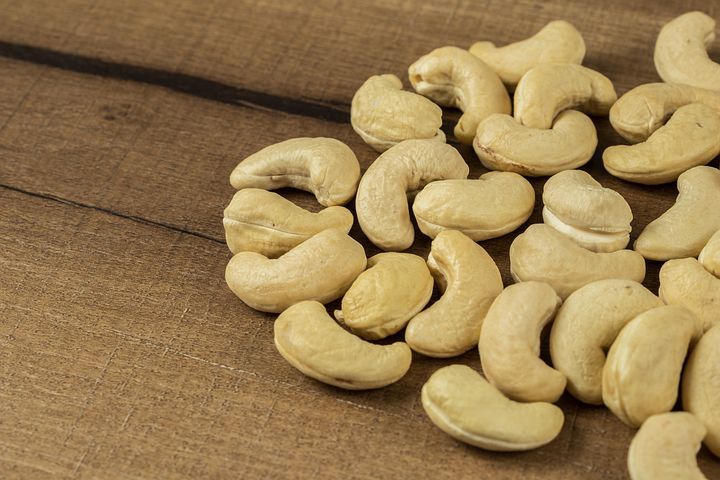Cashew
Cashew is a type of tree that is mostly grown in tropical areas around the world. It is known for producing a sweet nut that is commonly eaten as a snack or used in cooking. Here in Nigeria, we take it with Garri.
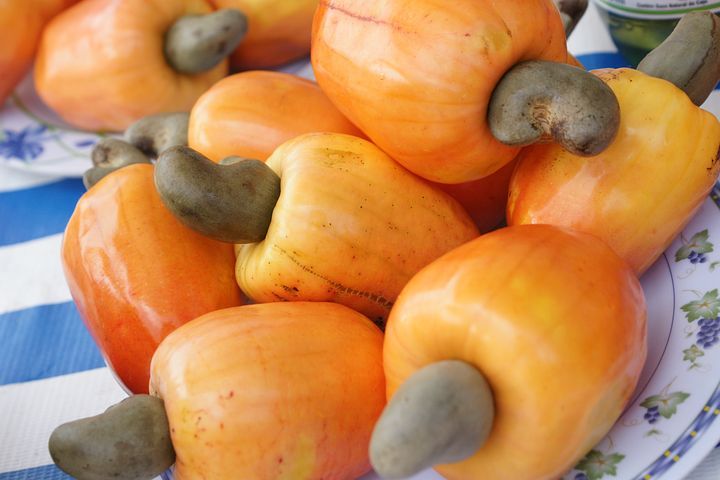
source: pixabay
The cashew nut is actually the seed that grows on the cashew flesh, which is the fruit of the cashew tree. The cashew fruit is also edible, but not like the nuts. The nuts has provided a wide range of products to people more than the flesh.
Cashews are also good source of protein, healthy fats, vitamins, and minerals. They are also low in sugar and contain no cholesterol.
Cashew nuts are something I don't joke with. When I was in Cross River state, in Nigeria, I ate cashew nuts a lot, together with garri
Where is Cashew grown the most
Cashews are grown in many regions around the world, but the largest producers of cashews are currently Vietnam, India, and Ivory Coast.
- Vietnam is currently the world's largest producer of cashews, accounting for approximately one-third of global production. India is the second-largest producer, accounting for around 20% of global production, while Ivory Coast is the third-largest producer, accounting for around 15% of global production.
Other major cashew producing countries include Brazil, Nigeria, Tanzania, Indonesia, and Guinea-Bissau. Cashew trees grow best in areas with warm, humid climates, and they are often cultivated cos of their seeds.
What is it used for?
Cashews are used in a lot of ways, including as a snack, in cooking, and in the production of various products.
LETS check out some of the most common uses of cashews:
Snacks: Cashews are commonly eaten as a snack on their own, either raw or roasted.
Cooking: Cashews are used in lots of dishes, including stir-fries, curries, and salads. They can be chopped or ground into a paste and used as a thickener for soups and sauces. I saw someone making something like this the other day and I was shocked though.
Dairy alternatives: Cashews are often used to make non-dairy milk alternatives, such as cashew milk, which can be used in place of cow's milk in recipes and as a beverage.
Desserts: Cashews are used in the production of many desserts, including cakes, cookies, and ice cream.
Nut butter: Cashew butter is a popular alternative butter to peanut butter and is used as a spread on toast, crackers, and other snacks.
Just forget it. If I keep writing now it's gonna be an unending list cause cashew has lots of uses.
Cashew in Nigeria
Cashews are important crop in Nigeria, both for domestic consumption and for export. Nigeria is currently one of the largest producers of cashews in the world, with the crop being grown in almost all states of the country.
Cashew production in my country Nigeria began in the 1950s, and the country has since become a major producer and exporter of the crop. The most of Nigeria's cashew production takes place in the north-central and south-western regions of the country, with major producing states including Oyo, Kogi, Benue, Anambra, Enugu, and Kwara.
In Nigeria, cashews are mainly used for the production of cashew nuts, which are important source of income for farmers. The nuts are also exported to other countries, where they are further processed and packaged for consumption. The cashew flesh/fruit is also consumed in Nigeria, either like that or processed into juice or wine.
The Nigerian government has recognized the potential of the cashew industry and has taken steps to support its growth. This includes providing funding and training for farmers, improving access to markets and infrastructure, and promoting the development of products such as cashew butter and cashew-based snacks.
Uses of Cashew in Nigeria
In Nigeria, cashews are used in various ways, including:
Cashew nuts: Cashew nuts are the most common and important product from the cashew tree in Nigeria. They are consumed as a snack or used in cooking, and they are also a major export product for the country.
Cashew fruit: The cashew flesh is the fruit of the cashew tree and is consumed in Nigeria, which is either eaten like that or processed into juice or wine. The juice is often mixed with other fruits to create a refreshing beverage.
Cashew kernel oil: Cashew kernel oil is extracted from the cashew nut and is used in the production of various products, including cosmetics, soaps, and insecticides.
Cashew snacks: In recent years, there has been an increasing demand for cashew-based snacks in Nigeria. These include roasted and salted cashews, cashew brittle, and cashew nut butter.
Cashew milk: Cashews can be used to make non-dairy milk alternatives, such as cashew milk, which is becoming more popular in Nigeria as more people adopt to it. I think this is the best product of the cashew nuts.
Also, cashews are used to make a lot of other things in Nigeria, including cakes, cookies, and candies.
In Nigeria, we see cashew as a valuable crop being used in many ways, both for domestic consumption and for export.
What are the nutritional values Cashew ??
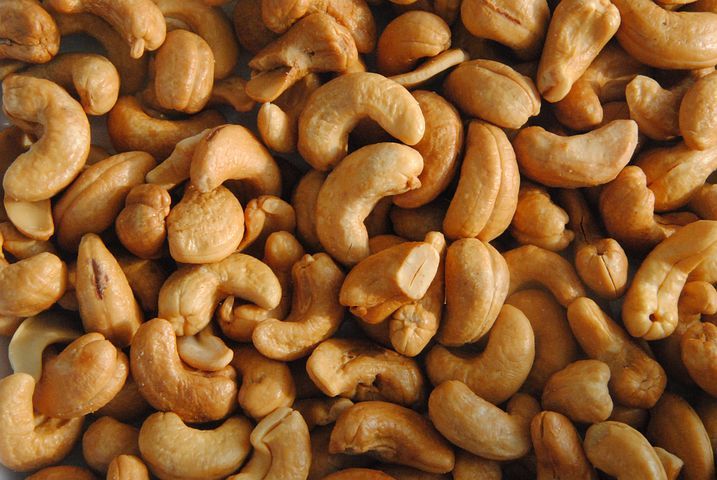
source: pixabay
Cashews are nutritional fruits that provide a range of vitamins, minerals, and other important compounds.
Protein: Cashews are good source of protein.
Healthy fats: Cashews are high in healthy fats, including monounsaturated and polyunsaturated fats, which can help to lower cholesterol levels and reduce the risk of heart disease.
Carbohydrates: Cashews are also good source of carbohydrates.
Fiber: Cashews are good source of fiber, which can help to promote healthy digestion and reduce the risk of chronic diseases such as diabetes and heart disease.
Vitamins: Cashews are good source of several important vitamins, including vitamin E, which is a good vitamin that helps to protect cells from damage, and B vitamins, which are important for energy production and brain function.
Minerals: Cashews are good source of several important minerals, including magnesium, phosphorus, copper, and zinc, which are important for bone health, immune function, and metabolism.
Cashews are nutritious food that can be a valuable part of a healthy diet.
Which part of Nigeria takes it the most?
Cashew is grown in almost all states in Nigeria, but some states are known to produce more cashew than others. The top cashew producing states in Nigeria include:
Benue State: Benue State is the largest cashew producing state in Nigeria. The state is located in the north-central region of Nigeria and has favourable climatic conditions for cashew cultivation.
Kogi State: Kogi State is another major cashew producing state in Nigeria. The state is also located in the north-central region of Nigeria and has a large number of cashew plantations.
Kwara State: Kwara State is located in the north-central region of Nigeria and is another important cashew producing state in the country.
Oyo State: Oyo State is located in the south-western region of Nigeria and is known for its large cashew plantations.
Enugu State: Enugu State is located in the south-eastern region of Nigeria and is a major cashew producing state in the country.
The north-central and south-western regions of Nigeria are the major cashew producing regions in the country, even though other states contributes little amount.
How is it being cultivated
This is how cashew is being cultivated
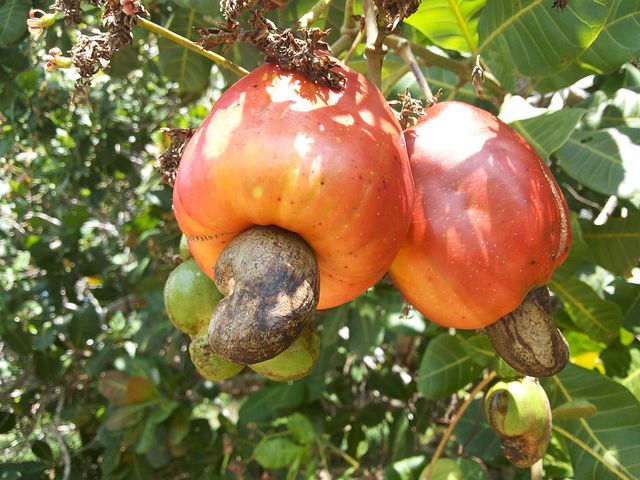
source: pixabay
Seed propagation: Cashew seeds are used for propagation in local methods. Cashew nuts are removed from the cashew fruit and allowed to dry for a few days. The dried nuts are then soaked in water for a few hours to soften the outer shell. The outer shell is then removed, and the seeds are dried again before planting. The seeds are then planted in soil, and the young seedlings are transplanted to their final location when they are around 3-4 months old.
Vegetative propagation: Vegetative propagation involves the use of vegetative parts of the cashew tree, such as stem cuttings, grafts, or budding. The vegetative parts are taken from the parent tree and grafted onto a young seedling, which produces a new tree with the same traits as the parent tree.
One good advantage of this method is to reproduce the same species of tree in another location.
Cashew trees requires well-drained soils, warm temperatures, and adequate rainfall or irrigation for good growth. They can be grown in different types of soils.
In Nigeria, cashew trees are mainly grown on small-scale farms and are often intercropped with other crops such as cassava, maize, and yams. They are usually harvested manually when the cashew fruit turns yellow and the nuts are fully developed, which is typically between January and April.
The major uses of cashew nuts in Nigeria
Cashew nuts are used for a lot of purposes in Nigeria. Here are some of the major uses of cashew nuts in the country:
Food: Cashew nuts are used as a food ingredient in Nigeria, especially in local dishes. They are often used in soups, stews, and sauces, and are also eaten roasted or salted as a snack.
Cashew oil production: Cashew nut is a source of oil, and the oil is extracted from the nuts for use in cooking and in the cosmetic industry. The oil is rich in vitamin E, which makes it a food ingredient in skin care products.
Industrial uses: Cashew nuts are used in various industrial applications, such as in the production of resin, paint, and varnish. The shell of the cashew nut is also used as a fuel in some industrial processes.
Animal feed: Cashew nut cake, which is a byproduct of cashew nut processing, is used as an animal feed in Nigeria. It is high in protein and is often fed to poultry and livestock.
Export: Cashew nuts are valuable export commodity for Nigeria. The country is one of the largest producers of cashew nuts in the world, and the nuts are exported to countries such as India, Vietnam, and the United States.
Cashew nuts are important crop in Nigeria and are used for a lot of purposes, both domestically and internationally.
Cashew nuts and Garri in Nigeria
In Nigeria, cashew nuts and garri are two important agricultural products that are widely consumed and have significant economic value.
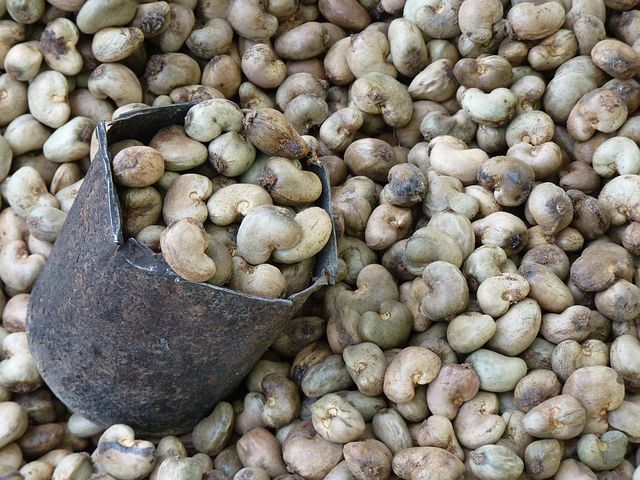
source: pixabay
Here are some of the ways in which these two products are connected:
Inter-cropping: Cashew trees are often inter-cropped with other crops such as cassava, maize, and yams. Garri is a popular food product made from cassava, and farmers may plant cassava alongside cashew trees to maximize land use and income.
Income generation: Both cashew nuts and garri are important sources of income for many farmers in Nigeria. Cashew nuts are often sold to processors or exporters, while garri is sold in local markets or transported to urban centers for sale.
Processing: Cashew nuts and garri are both processed products. Cashew nuts are processed to remove the outer shell and the edible kernel is roasted, salted, or used for oil production. Garri is made by peeling and grating cassava roots, fermenting the mash, then drying, sieving and frying the fermented mash to form garri.
Consumption: Both cashew nuts and garri are widely consumed in Nigeria. Cashew nuts are eaten roasted, salted, or used as an ingredient in cooking. Garri is a popular food in Nigeria and is consumed by people of all ages and backgrounds.
Drinking of Garri with cashew nuts
Drinking garri with cashew nuts is a popular food combination in Nigeria. Garri, which is made from cassava, is often consumed with different cookies, including cashew nuts.
As a snack: Cashew nuts are often eaten as a snack in Nigeria, and garri can be added to the mix to make a more filling and nutritious snack. The garri adds carbohydrates to the protein and healthy fats from the cashew nuts, making it a satisfying and energizing snack.
Garri and cashew: Taking Garri with sugar and milk, and mixing with cashew nuts makes a whole lot of sense you know. This one is the most popular method of taking Garri with cashew nuts. Instead of using our traditional way, that is using groundnuts/peanuts, the cashew nuts are used as a great substitute.
Which country in Africa consumes it the most?
Garri is a popular food product in many African countries, but it is difficult for me to determine which country consumes it the most.

source: pixabay
However, Nigeria is known to be one of the largest producers and consumers of garri in Africa.
In Nigeria, garri is consumed by people of all backgrounds and is often seen as a cheap option for meals. It can be consumed in a lot of ways, such as drinking it as a snack, eating it as a main meal with soup or stew, or using it as a base for other food products like eba and fufu.
Other African countries that consume garri include Ghana, Cameroon, Togo, and Benin, where it is also a popular food. In some of these countries, garri is also consumed with other traditional foods like cassava leaves, okra, and fish.
The bad side of cashew nuts
Allergies: Cashews are common allergen, and some people may experience severe allergic reactions after consuming them.
High fat content: Cashews are high in fat, with approximately 18 grams of fat for one. While some of these fats are healthy, excessive consumption can lead to weight gain and other health problems.
Roasting: Some cashews are roasted in oils that may contain harmful trans fats. Additionally, the high heat used in roasting may damage the nuts' fats and lead to the formation of harmful compounds.
Processing: Some cashews are processed with chemicals to remove the shells, which can leave behind trace amounts of these substances on the nuts.
Sustainability: Cashew farming has been associated with deforestation, soil degradation, and labour exploitation in some parts of the world.
How many years does it take to grow?
Cashew trees normally starts producing fruit after 2-3 years of planting, but they may take up to 5 years to reach full production. The trees continue to produce nuts for up to 20-30 years, with the highest yields obtained between 10-20 years of age.
The exact length of time it takes for a cashew tree to grow and reach full production depends on various factors such as soil type, climate, and management practices.
Is it good for both children and adults?
Yes, cashew nuts can be a healthy addition to the diets of both children and adults, in moderation.
Cashew nuts are good source of protein, healthy fats, fiber, and a range of vitamins and minerals, including magnesium, phosphorus, and zinc. These nutrients can provide many health benefits, such as supporting healthy brain function, promoting bone health, and aiding in digestion.
However, it is good that we note that cashew nuts are also high in calories and fat, so they should be consumed in moderation as part of a balanced diet. Overconsumption of cashew nuts or any other food can lead to weight gain and other health issues.
Cashew nuts may not be suitable for some people with allergies or medical conditions, so it is always a good idea to consult with a healthcare professional before making any significant changes to your diet.
Conclusion

In conclusion, cashew nuts are popular fruits product in Nigeria and other parts of the world, and they offer a range of nutritional benefits. They are good source of protein, healthy fats, fiber, and a range of vitamins and minerals, and they can support many aspects of health, such as brain function, bone health, and digestion.
I am happy to have compiled this write up and I'm sure it will be of great help to lots of people. Next we will talk about mango.
